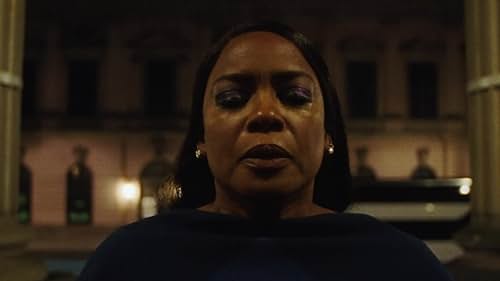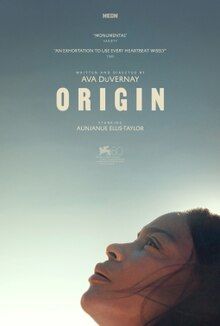Eye For Film >> Movies >> Origin (2023) Film Review
Origin
Reviewed by: Jennie Kermode

The last few years has seen a number of vicious attacks, within the US, on the teaching of Critical Race Theory (CRT), which has been deliberately misrepresented and made into a political football. Where educational institutions are now banned from discussing it in some states, cinema has stepped in. Alongside Netflix offering Stamped From The Beginning, Origin is one of the biggest films to endeavour to fill the void, explaining that racism is not just a matter of some individuals mistreating others, but operates at a systemic level, and is motivated not simply by hate but by the pursuit of economic advantage. Origin, which is based on Isabel Wilkerson’s book Caste, goes a step further by putting this in a larger context.
It’s a difficult thing to pitch effectively. In the absence of proper education, everything needs to be explained from first principles in simple, accessible terms, but this needs to be achieved without putting off those members of the audience who do know more about the subject. To this end, Ava DuVernay mixes documentary and fiction. She invites us to identify with a lightly fictionalised version of Wilkerson (Aunjanue Ellis-Taylor, who has received major awards attention for her work here), as she goes on a personal journey to gain a deeper understanding of the world around her. Along the way, she talks to relatives and community members who are surprised by her changing thinking, providing opportunities to discuss key concepts in a way that doesn’t come across as patronising, and giving the film some emotional weight which will help them to stick in viewers’ minds.
As a journalist, Wilkerson has the right skills for the job, and she’s ready to start changing the way she thinks and lives because, at the start of the film, she is widowed. The sudden, unexpected death of her husband Brett (Jon Bernthal) throws her life into disarray, and the experience is made worse by friends and family members, after just a little time has passed, suggesting that this is an opportunity to get into a relationship with a Black man, Brett’s whiteness never having sat easily with them. After she also has an uncomfortable encounter with a racist white plumber, she begins to ask herself just why it is that race is such a big deal. What follows is a series of eye-opening encounters which gradually her to understand that larger context.
That one person would happen to have all these experiences come together in such a fortuitous way might sound unrealistic, but if you think about it at a population level, the odds are that there will always be some people this happens to. Indeed, we can see the writings of some of them scattered through US history, and DuVernay’s film pays tribute to that with both observations and recreations. In particular, it addresses one of the areas which most dramatically disrupted white people’s dominance in the US: the Second World War, in which African Americans not only learned what it was like to be treated more equally when serving overseas, but began to draw parallels between the treatment they experienced at home and the Nazi treatment of Jewish people. One could make a hundred films about this subject alone – and subsequent efforts to change the narrative – without running short of material, but DuVernay manages to skim through it in such a way as to give people plenty of pointers for their own research.
The other big comparator used here is India’s caste system, with Wilkerson travelling to that country to meet Dalit people and learn about their experiences. With them and with Jewish people, she engages in those difficult conversations in which people whose ancestors have been through unimaginable atrocities find themselves arguing over who suffered the most before gradually coming to the realisation that this is less important than what they have in common, and what they might achieve by standing in solidarity. Some of this is rather heavy-handed but, again, the film is more concerned with educating than with delivering nuanced drama. It eschews subtitles, presumably for the same reason, and the family story it tells sometimes takes on the quality of a soap opera, but this should help its reach.
This is, ultimately, just one piece of a much bigger puzzle, with examples of caste-style systems going far beyond these and far deeper into history. It could only ever be a starting point, but DuVernay seems to recognise that. She’s not here to tell people what to think – rather, she’s presenting them with the tools to start thinking for themselves and making their own discoveries. Ellis-Taylor does a good job of conveying the excitement that such a process can inspire, and promoting an intellectual curiosity which could be life-changing for viewers. Origin is not an artistic triumph in the conventional sense but it is a very practically constructed and very necessary film.
Reviewed on: 19 Jan 2024


















